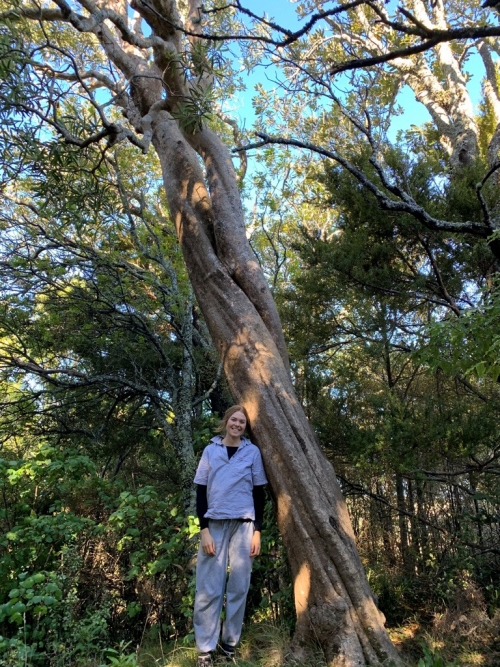
Current filter:

A Hawke’s Bay-born masters degree student is testing an exciting new biodiversity monitoring framework for national reporting led by the Regional Council.
Ruby MacGillivray, who’s testing the framework, is passionate about looking after the environment, having studied conservation, ecology, environmental management, and ecological engineering since 2017.
“I grew up on a farm in Maraetōtara which established my love for the outdoors. My parents used to keep me entertained by turning over a fallen post or log to look for creepy crawlies while they did work outside. I celebrated my birthdays in the Mohi Bush reserve, bravely dipped my toes in the water at Maraetōtara Falls during winter and went on trips to Waikaremoana. The chorus of the cicadas and birds have no doubt caused damage to my ears over the years,” says Ms MacGillivray.
“My curiosity for nature, how it works, and how much it changes got bigger as I grew older and has driven my passion and studies,” she adds.
Ms MacGillivray started her two-year Master’s in Natural Resource Management and Ecological Engineering programme in 2020 with Lincoln University, part of which is a year-long research thesis.
“For my thesis, I’m pioneering the new Tier 2 Monitoring Framework developed by Hawke’s Bay Regional Council in partnership with Manaaki Whenua Landcare Research. Using this framework, I’m monitoring a selection of ten ecologically prioritised sites and comparing each of the sites based on different fencing management strategies, vegetation and plants, soil types, and bird life. A cool part of this is creating audio recordings, where I record bird song in each site for just under a month.”
Ms MacGillivray is looking at sites that cover a range of different habitat types throughout the region including Cape Kidnappers, Raukawa, Waiwhare, Eskdale and Pōrangahau.
“I’m in a really rewarding position being able to work and research in Hawke’s Bay as it allows me to give back and appreciate the environment which has inspired my passion. This research caters to my fascination about the interconnections and interactions between different forms of life and the environment, in a place that I am so very attached to.”
Regional Council Acting Manager Catchment Services Mark Mitchell says the study is valuable to understanding how successful the framework is.
“It’s great to be able to get this framework road-tested and we’re looking forward to seeing the results from the study to know how successful the framework is at measuring the effectiveness of different management strategies,” says Mr Mitchell. “This research will also give an overview of the ecological compositions of these Hawke’s Bay sites, which includes birds and vegetation. What is being done now will be a baseline for future research and monitoring for Hawke’s Bay.”
Results of the research will be released later this year.
Hawke’s Bay Regional Council is committed to supporting healthy and functioning biodiversity, and this project is part of looking after priority ecosystems, species, and habitats.
21 May 2021
Disclaimers and Copyright
While every endeavour has been taken by the Hawke's Bay Regional Council to ensure that the information on this website is
accurate and up to date, Hawke's Bay Regional Council shall not be liable for any loss suffered through the use, directly or indirectly, of information on this website. Information contained has been assembled in good faith.
Some of the information available in this site is from the New Zealand Public domain and supplied by relevant
government agencies. Hawke's Bay Regional Council cannot accept any liability for its accuracy or content.
Portions of the information and material on this site, including data, pages, documents, online
graphics and images are protected by copyright, unless specifically notified to the contrary. Externally sourced
information or material is copyright to the respective provider.
© Hawke's Bay Regional Council - www.hbrc.govt.nz / +64 6 835 9200 / info@hbrc.govt.nz